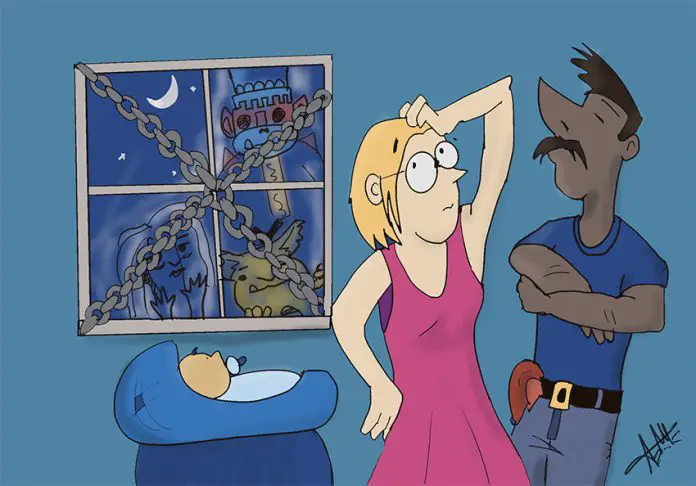Browsing through Facebook the other day, I noticed a post from a women’s group I’m a part of, mostly (but not exclusively) made up of wives who’ve moved to Mexico after their Mexican husbands were deported from the US.
Many of the women now find themselves living in the “ranchos” (little towns) that their husbands grew up in, with his extended family, a circumstance that can be quite an adjustment.
In addition to trying to acclimate to the dynamics of (extended) family life (pro tip: it’s a lot more intense around here) and sometimes country life in a place where most newcomers don’t speak the language well or completely understand the culture, this particular post brought to my attention yet another difference some have had to content with:
Witches.
“My husband won’t let us sleep with the windows open after midnight because he thinks witches will come and steal our baby, but it’s too hot to keep them closed!”
Nahuales, chaneques, and even owls (potenders of death, I hear) can cause quite a stir, too. Ask around, and you’ll likely discover that way more people than you would have expected truly believe in these creatures.
The world of Mexican supernatural folklore opened up for me in a major way years ago when I accompanied my then-husband to a small town nearby called Jalcomulco, famous for its deep-jungle river rapids and the kinds of hippies attracted to deep-jungle river rapids.
The place itself feels extra lush and primeval – admittedly, it could just be the humidity – and it’s easy to see how its residents could believe in magical wood sprites and the like.
On that trip, my husband’s friend, a college-educated engineer, matter-of-factly told us the story of the time he’d seen La Llorona (llorona is the feminine noun version of the verb llorar, “to cry,” but I prefer my translation, “The Wailer,” because it sounds extra dramatic and tortured.)
La Llorona is perhaps one of the most famous scary stories of Mexican lore. The exact details can change from place to place, but it basically goes like this: she’s a mother who’s killed her children (usually by drowning), sometimes to save them from a worse fate, and sometimes to avenge her abusive Spanish husband. She wanders the streets at night crying for them. She’s dressed all in white and her face is covered with a veil. If she turns around to face you, you die instantly.
The friend didn’t explain how he and all of his friends, family, and neighbors had survived their encounters with La Llorona, but that wasn’t the point. Besides, he had other good stories.
With my enthusiastic encouragement, he went on to tell us about how he knew that his neighbor was a nahual, someone who turns into an animal during the night to make mischief and otherwise wreak havoc on the good people of the community and/or their property, crops, etc.
“There was a big wolf terrorizing the cows in a field right outside of town, but a farmer managed to cut its front-left leg with his machete. The next morning, the lady that lives next door came out with her left arm bandaged, saying she’d been cut.”
I practically squealed with delight and excitement at the story. Later on, I lowered my voice. “You don’t really believe in these things though, do you?”
“What do you mean? We’ve all seen them.”
One of the things that makes humans super-duper adorable and also kind of terrifying is our natural proclivity for magical thinking. Belief in the supernatural seems built into our brains by evolution, perhaps a natural byproduct of our big-brained creativity. No society has ever developed without the gods and their magic developing along with it.
Why? Well, we humans want reasons for why things happen…especially bad things. We want explanations: someone must be held accountable! And we’ll have them, even if we have to make them up ourselves. Making sense of our world is just what we do, and every culture’s got a different way of making that happen.
For most of human history, magic made perfect sense: we didn’t understand how nature worked and we could only control it (or fool ourselves into thinking we were controlling it) to a certain extent, so the rest had to be the work of others more powerful than ourselves.
If this kind of mystical belief weren’t so hardwired into us, we’d have collectively let all that go with the onset of actual science. Alas, we simply cannot accept the possibility of our insignificance or the idea that sometimes terrible things happen for no reason to people that don’t deserve it, especially when it comes to the tiniest among us.
The baby didn’t die of SIDS; a witch came in the night and stole its breath. That other baby doesn’t have colic; it was switched out with a changeling, doubly-likely if it hasn’t been baptized yet (practically a protection spell). You’re not sick and fatigued from a virus; the evil eye has fallen upon you – someone’s jealous! Did someone really disappear, or did they wander into the realm of a mischievous chaneque, a little trouble-making elf known for giving humans some major side-eye and getting them lost in the woods?
Inspired when I first learned about them, I even wrote a story called Chaneque, which I think I’ll edit and republish on my blog this weekend – this topic’s got me excited now!
I’m no fervent believer, but oh, how I love the way my mind sparkles with the possibilities of a magical world that we’re only allowed brief glimpses of! In the words of The Office’s Michael Scott: “I’m not superstitious. I’m just a little stitious.”
Sarah DeVries is a writer and translator based in Xalapa, Veracruz. She can be reached through her website, sarahedevries.substack.com
